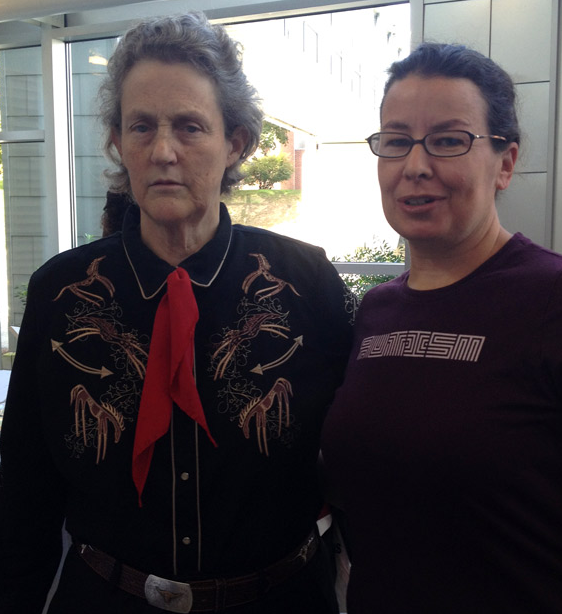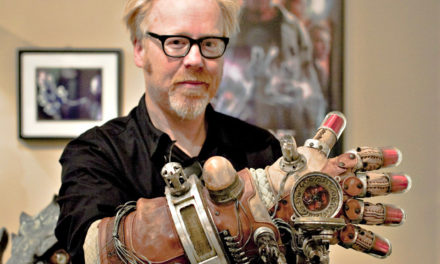Kelley Fitch’s podcast, Joyriding in Autismland, is yet another facet to her ever-evolving microfunding project, Kid Gigawatt, a website she and her husband created to help fund therapies for children with autism. As the mother of an autistic child, Fitch understands the intricacies of the condition, and approaches the challenges she and her family encounter with whit and honesty.
She graciously took some time to answer a few questions for me during what I know to be any parent’s busy season.
Tell me a little about your background, Kid Gigawatt, and what led you to podcasting?
I’m from Chapel Hill, North Carolina, and currently live in Maine with my husband, three kids, a dog and a cat. I had worked in the children’s wholesale clothing business for 9 years previously, selling a Dutch line to stores across the States. I really enjoyed the creative aspects of marketing the line – creating catalogs, photo shoots, and videos – but wanted to work for myself and do something that impacted other people like us. Our youngest child, Roman, has autism, and my husband and I concocted a plan to combine what we know how to do creatively with a purpose.
Kid Gigawatt emerged, so dubbed after one of the Romanator’s many nicknames, and we are learning and iterating as we go. The goal is to sell t-shirts and collect small donations to microfund super fun therapies for other kiddos with autism, and so far we have given 7 weeks of therapeutic horseback riding to a kiddo in Maine, and are just about to fund after-school jump rope lessons for a kiddo in North Carolina. Our next gig will be funding a skier with autism in Vermont!
I’m a fan and a listener of podcasts, and I’d like to say that I fell into podcasting, but unfortunately I don’t have a Cartesian mind that delights in technological pursuits. But I finally got myself out of learning mode and into doing mode when I scored an interview with wine connoisseur and social media expert Gary Vaynerchuk. I read a ton on him, watched some of his videos and keynote speeches, and channeled Terry Gross, hoping for the best. It was a great interview to start with- he’s a really generous and friendly guy! After the interview finally went live though, I wrote on my blog that my eyes were like tiny raisins, and that I was going to go and sit in a dark room for a while. And I did.
What role does humor plays in your life?
Humor is one of the biggest ways that we communicate with Roman – he is so. very. funny. He collides words together in unexpected ways, like “funkcious” or “neighbot”, which really should be in the dictionary. And he’ll randomly declare that he stole a deer, or that he forgot to clean his brains, or that he can smell a seahorse. He loves to make people laugh!
On a personal level, humor has been my dark friend throughout life. I’m the youngest of three myself, and vying for the laugh has probably gotten me out of a few close shaves with my siblings. It’s my best coping mechanism.
You recently had Roman, along with your other children, answer a few questions on the show. What was it like talking about Roman’s challenges as a family?
It was actually really eye-opening. Because while living with autism is something we do on the daily, it’s not something we TALK about often. And I was pretty blown away by hearing my 17-year old’s take on what the hardest part of being Roman’s brother is for him. Spoiler alert: it’s not that he’s embarrassed by him, but rather that he’s worried about him not having the same experiences as he does. And my 14-year old daughter struggles most with people judging Roman without knowing him.
Roman, on the other hand, was so distracted by my new microphone, that all he could answer was “poop!” to every question on my first pass. After a couple of tries though, he rallied, and it was cool to hear his answers too.
What’s the biggest misconception people have about autism in your opinion?
Autism is invisible, and often masquerades as a straight case of crappy parenting. But I think that the biggest misconception surrounding autism is that it presents similarly in different people. We have these subconcious Rainman archetypes in our heads. But every individual – on or off the spectrum – has their own mix of abilities and challenges that constitute their unique personality.
Another huge misconception is that autism is a sort of static, paralyzing condition. Sure, autism is also often accompanied by other conditions and syndromes, which complicates things. Roman also has ADHD, sensory issues, undiagnosed Tourettes (<– trust me on that one!), and had Epilepsy up until a successful seizure surgery 6 years ago. But despite all those challenges, he has made so much progress with years of Speech Therapy, Occupational Therapy, and Behavioral Therapy. He does therapeutic horseback riding every week, has in-home support, and goes to public school with a lot of support. He is on his own curve towards independence.
Your chat with Temple Grandin was exceptional pod. What was your biggest takeaway from that conversation?
Thank you! I loved speaking with her- she is such an incredible inspiration to me. I think my biggest revelation from the interview was that we need to be working harder on finding places in our society for kiddos growing up on the spectrum. She mentioned that Hans Asperger’s original subjects have had close to statistically normal employment records throughout the years. But so many of our kids are underemployed, and we need to be finding volunteering opportunities and low-pressure work environments for them that flow from their obsessions and cater to their strengths.
How do you think the perception of children on the spectrum will change in the future?
This is a great question. In some societies, autism is a respected ticket to the “red path” of shamanism, if individuals choose to walk it. But in our so-called “modern” society, differences are frowned upon.
I interviewed James Ball (autism consultant and chair of the national Autism Society) on why he thinks the latest CDC figures on autism put it at a startling 1 in 50 kids. He is seeing more kids being diagnosed at the higher functioning end of the spectrum, perhaps as a result of more targeted diagnosis criteria, or of parents seeking a diagnosis to receive services. So I think that there will be more awareness in the public of these quirky kids, and hopefully more acceptance. This is really the impetus behind launching the Joyriding in Autismland podcast. Because personally? I’m striving for a future in which normal isn’t.
What’s next for Joyriding in Autismland?
We’re going to be taking our family and our podcast on the road this summer, driving from Portland Maine to Portland Oregon, and doing all sorts of fun activities with Roman along the way. We’re hoping to interview lots of interesting people, and it should be an adventure. (<– understatement.)






